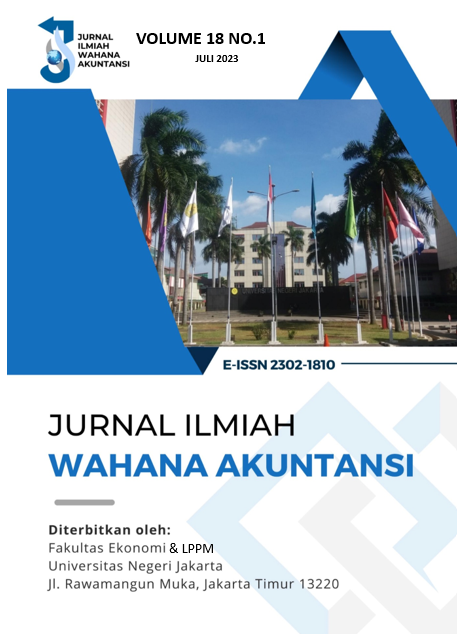ESG Risk Determinant Factors: Study on Indonesia Listed Firm
DOI:
https://doi.org/10.21009/wahana.18.016Keywords:
ESG, Firm performance, institutional investor structure, firm size, leverageAbstract
Companies worldwide are now looking at long-term and sustainable development in environmental, social, and governance issues in addition to short-term earnings. This paradigm change occurred in Indonesia as well. Companies listed on the Indonesian stock exchange are increasingly vying to establish sustainable operations because they understand the value of ESG considerations. However, what is the factors that determine the ESG risk rating? The purpose of this research is to determine what factors influence ESG risk. Based on the data that has been obtained, the researchers tested the data using PLS-SEM with Warppls 8.0. Then the following results were obtained: institutional investor structure has a negative effect on ESG risk; firm performance, firm size, and leverage have a positive influence on ESG risk; and lastly, firm performance can be a moderating variable of the relationship between institutional investor structure and ESG risk.
References
Alam, M., Tahir, Y. M., Saif-, A. Y. H., Ali, W. B., Muda, R., Nordin, S., Alam, M., Tahir, Y. M., & Saif-alyousfi, A. Y. H. (2022). Financial factors influencing environmental, social and governance ratings of public listed companies in Bursa Malaysia. Cogent Business & Management, 9(1). https://doi.org/10.1080/23311975.2022.2118207
Alareeni, B. A., & Hamdan, A. (2020). ESG impact on performance of US S&P 500-listed firm. Corporate Governance International Journal of Business in Society, October. https://doi.org/10.1108/CG-06-2020-0258
Artiach, T., Lee, D., Nelson, D., & Walker, J. (2010). The determinants of corporate sustainability performance. Accounting and Finance, 50(1), 31–51. https://doi.org/10.1111/j.1467-629X.2009.00315.x
Baron, R. M., & Kenny, D. A. (1986). The Moderator-Mediator Variable Distinction in Social Psychological Research: Conceptual, Strategic, and Statistical Considerations. Journal of Personality and Social Psychology, 51(6), 1173–1182.
Benz, L., Paulus, S., Rohleder, M., & Wilkens, M. (2020). Ownership Comes with Responsibility – the Impact of Ownership Characteristics on CSR. SSRN Electronic Journal. https://doi.org/10.2139/ssrn.3606143
Buchanan, B., Cao, C. X., & Chen, C. (2018). Corporate social responsibility, firm value, and influential institutional ownership. Journal of Corporate Finance, 52, 73–95. https://doi.org/10.1016/j.jcorpfin.2018.07.004
Chams, N., García-Blandón, J., & Hassan, K. (2021). Role Reversal ! Financial Performance as an Antecedent of ESG : The Moderating Effect of Total Quality Management. Sustainability, 1–18. https://doi.org/https:// doi.org/10.3390/su13137026
Cohen, G. (2022). ESG risks and corporate survival. Environment Systems and Decisions, 43(1), 16–21. https://doi.org/10.1007/s10669-022-09886-8
Cohen, G. (2023). The impact of ESG risks on corporate value. Review of Quantitative Finance and Accounting, 60(4), 1451–1468. https://doi.org/10.1007/s11156-023-01135-6
Cornell, B. (2021). ESG preferences, riskand return. European Financial Management, 27(1), 12–19. https://doi.org/10.1111/eufm.12295
Cucari, N., Esposito De Falco, S., & Orlando, B. (2018). Diversity of Board of Directors and Environmental Social Governance: Evidence from Italian Listed Companies.Corporate Social Responsibility and Environmental Management, 25(3), 250–266. https://doi.org/10.1002/csr.1452
Czerwińska, T., & Kaźmierkiewicz, P. (2015). ESG Rating in Investment Risk Analysis of Companies Listed on the Public Market in Poland. EconomicNotes, 44(2), 211–248. https://doi.org/10.1111/ecno.12031
D’Amico, E., Coluccia, D., Fontana, S., & Solimene, S. (2016). Factors Influencing Corporate Environmental Disclosure. Business Strategy and the Environment, 25(3), 178–192. https://doi.org/10.1002/bse.1865
Ellili, N. O. D. (2020). Environmental, social, and governance disclosure, ownership structure and cost of capital: Evidence from the UAE. Sustainability (Switzerland), 12(18). https://doi.org/10.3390/su12187706
Freeman, R. E. (2015). StakeholderTheory. Wiley Encyclopedia of Management, 1–6. https://doi.org/10.1002/9781118785317.weom020179
Freeman, R. E., Phillips, R., & Sisodia, R. (2020). Tensions in Stakeholder Theory. Business and Society, 59(2), 213–231. https://doi.org/10.1177/0007650318773750
Ge, W., & Liu, M. (2015). Corporate social responsibility and the cost of corporate bonds. Journal of Accounting and Public Policy, 34(6), 597–624. https://doi.org/10.1016/j.jaccpubpol.2015.05.008
Hair, J. F., Risher, J. J., Sarstedt, M., & Ringle, C. M. (2019). When to use and how to report the results of PLS-SEM. European Business Review, 31(1), 2–24. https://doi.org/10.1108/EBR-11-2018-0203
Hidayat, I. N., Maulana, I., & Andriani, N. (2021). Menghubungkan CSR Rating, Kinerja Perusahaan dan Nilai Perusahaan. Jurnal Akuntansi Dan Keuangan, 9(2), 69–78. https://doi.org/10.29103/jak.v9i2.3765Horváthová, E. (2010). Does environmental performance affect financial performance? A meta-analysis. Ecological Economics, 70(1), 52–59. https://doi.org/10.1016/j.ecolecon.2010.04.004
Jensen, M. C. (1986). Agency Cost Of Free Cash Flow, Corporate Finance, and Takeovers. American Economic Review, 76(2), 323–329. https://doi.org/10.2139/ssrn.99580
Jensen, M. C., & Meckling, W. H. (1976). Theory of the firm: Managerial behavior, agency costs and ownership structure. Journal of Financial Economics, 3(4), 305–360. https://doi.org/10.1016/0304-405X(76)90026-X
Julian, S. D., & Ofori-Dankwa, J. C. (2013). Financial resource availability and corporate social responsibility expenditures in a sub-Saharan economy: The institutional difference hypothesis. Strategic Management Journal, 34, 1314–1330. https://doi.org/10.1002/smj.2070
Karina, D. R. M., & Setiadi, I. (2020). Pengaruh CSR Terhadap Nilai Perusahaan Dengan GCG Sebagai Pemoderasi. Jurnal Riset Akuntansi Mercu Buana, 6(1), 37. https://doi.org/10.26486/jramb.v6i1.1054
Kock, N. (2015). PLS-based SEM Algorithms: The Good Neighbor Assumption, Collinearity, and Nonlinearity. Information Management and Business Review, 7(2), 113–130. https://doi.org/10.22610/imbr.v7i2.1146
Kock, N. (2022). WarpPLS user manual : Version 8.0. ScriptWarp Systems, 1–122.
Kusuma, A. P. A.,& Koesrindartoto, D. P. (2014). Sustainability Practices and Financial Performance : An Empirical Evidence from Indonesia. International Conference on Trends in Economics, Humanities and Management (ICTEHM’14), 11–15. https://doi.org/10.15242/icehm.ed0814010
Lavin, J. F., & Montecinos-Pearce, A. A. (2021). Esg disclosure in an emerging market: An empirical analysis of the influence of board characteristics and ownership structure. Sustainability (Switzerland), 13(19). https://doi.org/10.3390/su131910498
Mahoney, P. G., & Mahoney, J. D. (2021). The New Separation of Ownership and Control: Institutional Investors and ESG. Columbia Business Law Review, 2(840), 840–880.Majoch, A. A. A., Gifford, E. J. M., & Hoepner, A. G. F. (2014). Active Ownership and ESG Performance. SSRN Electronic Journal. https://doi.org/10.2139/ssrn.2496903
Martínez-Ferrero, J., & Lozano, M. B. (2021). The Nonlinear Relation between Institutional Ownership and Environmental, Social and Governance Performance in Emerging Countries. Sustainability (Switzerland), 13(3), 1–16. https://doi.org/10.3390/su13031586
Maulana, I. (2020). Analisis Pengaruh Dewan Komisaris Independen, Kepemilikan Manajerial dan Kepemilikan Institusional Terhadap Kinerja Perusahaan Jasa Keuangan di Indonesia. Jurnal REKSA: Rekayasa Keuangan, Syariah Dan Audit, 7(1), 11. https://doi.org/10.12928/j.reksa.v7i1.2455
Maulana, I., & Haryadi, B. (2022). Etika Bisnis, Corporate Governance, dan Stakeholder. Jurnal Wira Ekonomi Mikroskil, 12(02), 55–62. https://doi.org/10.55601/jwem.v12i2.882
Maulana, I., Haryadi, B., & Arief, M. (2022). The Corporate Governance Mechanism on Earnings Management and Firm Performance. AKRUAL: Jurnal Akuntansi, 14(1), 1–16. https://doi.org/10.26740/jaj.v14n1.p1-16
Maulana, I., Wildan, M. A., & Andriani, N. (2021). Pengaruh Struktur Kepemilikan Terhadap Kinerja Perusahaan Dimoderasi Oleh Karakteristik Dewan Komisaris. Jurnal Akuntansi, 13(1), 173–187. https://doi.org/10.28932/jam.v13i1.2934
Ortas, E., Álvarez, I., & Garayar, A. (2015). The Environmental, Social, Governance, and Financial Performance Effects on Companies that Adopt The United Nations Global Compact. Sustainability (Switzerland), 7(2), 1932–1956. https://doi.org/10.3390/su7021932Peloza, J. (2009). The Challenge of Measuring Financial Impacts from Investments in Corporate Social Performance. Journal of Management, 35(6), 1518–1541. https://doi.org/10.1177/0149206309335188
Peng, L. S., & Isa, M. (2020). Environmental, Social and Governance (ESG) Practices and Performance in Shariah Firms: Agency or Stakeholder theory? Asian Academy of Management Journal of Accounting and Finance, 16(1), 1–34. https://doi.org/10.21315/aamjaf2020.16.1.1
Saraswati, E., & Lestari, A. P. (2021). Does CSR Disclosure Improve Firm's Access to Finance and Reduce Firm Risk? Jurnal Reviu Akuntansi Dan Keuangan, 11(1), 17–29. https://doi.org/10.22219/jrak.v11i1.14961
Schanzenbach, M. M., & Sitkoff, R. H.(2020). ESG Investing: Theory, Evidence, and Fiduciary Principles. Journal of Financial Planning, 5349(October), 42–50. http://www.law.harvard.edu/programs/olin_centerhttp://ssrn.com/abstract=3684979
Sharma, P., Panday, P., & Dangwal, R. C. (2020). Determinants of Environmental, Social and Corporate Governance (ESG) Disclosure: A Study of Indian Companies. International Journal of Disclosure and Governance, 0123456789. https://doi.org/10.1057/s41310-020-00085-y
Solimun, Fernandes, A. A. R., & Nurjannah. (2017). Metode Statistika Multivariat Pemodelan Persamaan Struktural (SEM) Pendekatan WarpPLS. UB Press.
Sustainalytics. (2022). Understanding Materiality Lessons from Industries with High ESG Risk Acknowledgements Risk Ratings Oversight. https://connect.sustainalytics.com/hubfs/SCS/Ebooks/Understanding Materiality/Understanding-Materiality-5-High-ESG-Risk-Insdustries-April2022.pdf
Yadav, S. (2020). Institutional Ownership and Corporate Social Performance in Emerging Economies Multinationals: Evidence from India. Indian Journal of Corporate Governance, 13(2), 227–252. https://doi.org/10.1177/0974686220966812
Downloads
Published
How to Cite
Issue
Section
License

Jurnal Ilmiah Wahana Akuntansi is licensed under a Creative Commons Attribution-NonCommercial-ShareAlike 4.0 International License.
Articles in Jurnal Ilmiah Wahana Akuntansi are Open Access articles published under the Creative Commons CC BY-NC-SA License. This license permits use, distribution and reproduction in any medium for non-commercial purposes only, provided the original work and source is properly cited. Any derivative of the original must be distributed under the same license as the original.











